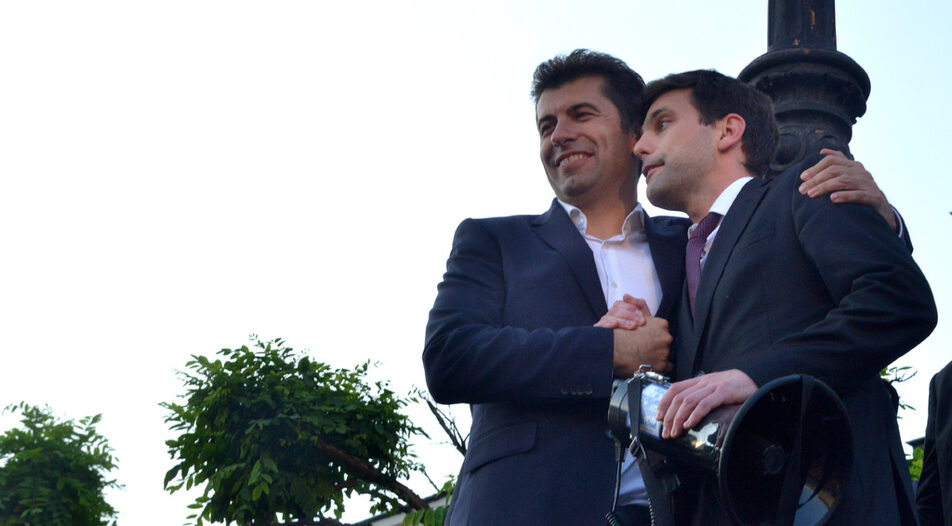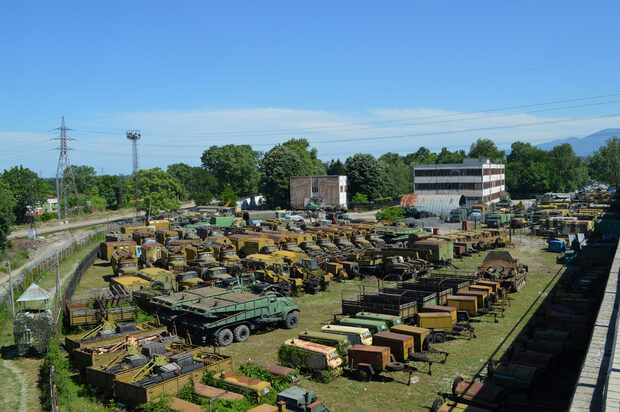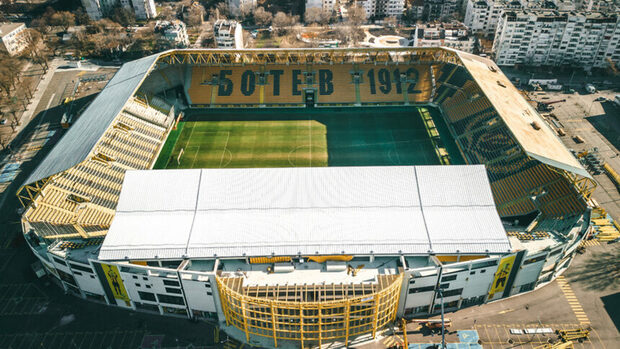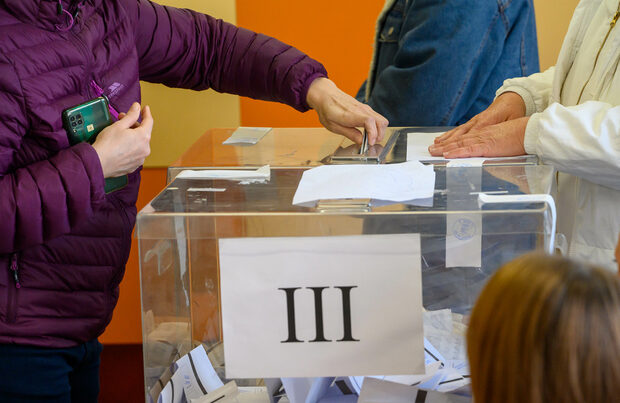It's been a momentous 8 days. Even for hardened devotees of the muddy rivers of Bulgarian political life, the pace of events in the past week has been breathtaking (and from a journalistic point of view, rather tiring).
It took There is such a people's party precisely that long to leave the ruling coalition on the direct order of its founder Slavi Trifonov, have its parliamentary group split into two, launch a campaign against the Speaker of the National Assembly and, by Thursday, successfully oust him alongside GERB and MRF - two parties that were its supposed sworn enemies for the past two years.
This means that Bulgaria now effectively has a new four-party coalition consisting of what's left of TISP, GERB, MRF and the radicals from Vazrazhdane party. With their 126 MPs, they voted out Parliament head Nikola Minchev (WCC).
The main purpose of the vote, of course, has little to do with Mr Minchev, who was in fact almost universally praised by deputies from most factions during heated debates on Thursday. MRF deputy chairman Yordan Tsonev summarized the real intention behind the vote in a short, clear sentence: "We are not here to prop up your incompetent and corrupt government, but to bring it down. And we will bring it down."
The new majority has the capacity to do that as soon as this weekend. GERB filed a motion of no-confidence against the PM Kiril Petkov and his cabinet on Tuesday, blaming the government for "destructive" fiscal and economic policies. And if you wonder why would that happen on a weekend since the law says up to 7 days, rumors have it that some parties are rather worried whether they can keep all of their members on board for the vote.
Of course, the prospect of a government collapse and yet another election cycle in the midst of an inflation spiral and a war nearby is not especially heartening. We are in for yet more rough days ahead.
Yet there are two silver linings to keep in mind through all this.
First, GERB is not back, yet. It's one step closer to getting revenge, but there is a sea of difference between bringing a government down and electing another. TISP might pretend to be gravely insulted by their ex-partners to justify voting against them, but to vote for a GERB-backed government is a whole new ball game.
And second, TISP's brutal volte-face will not only dent their image but more importantly - will reveal their inner core to parts of the Bulgarian public. Say what they will, politics these days is not exactly Game of Thrones and such moves have consequences. The power-brokers who pulled the levers for this theater could well end up getting more exposure - just the thing they hate.
This newlsetter was helped by: Ognyan Georgiev
1. Politics this week:
N. Macedonia veto: how to lose friends and alienate peopleThe political crisis in Bulgaria, seemingly provoked by the Macedonian question, has had a detrimental effect far beyond domestic politics. It practically put a spoke in the wheel of the EU's Western Balkan integration policy. And fewer and fewer leaders are trying to be diplomatic about it.
For example, on Wednesday, Albanian Prime Minister Edi Rama told Politico he doesn't expect an EU summit next week to clear the way for his country to begin membership talks, pointing a finger to Bulgaria. "I don't have any expectations. I think nothing will happen. Albania and North Macedonia will not formally open talks to have accession," he told the Brussels-based media.
And with Prime Minister Petkov announcing his cabinet will transfer the prerogative over any decision for lifting the veto to the National Assembly, he practically washed his hands of a primary foreign policy matter. Not a good omen for Skopje, nor for Sofia, for that matter.
Turns out, Alexis Tsipras in Greece had quite some balls back in 2018.
The sorry state of the Bulgarian army
This week, the annual Report on the State of Defense and Armed Forces of the Republic of Bulgaria for 2021 was submitted to Parliament - and it's distinctly underwhelming. The audit highlights the army's serious problems.They can be summarized as follows:
- the number of unfilled places has gone up 4%, reaching 16.4%
- the voluntary reserve has about 13% of all of its spaces filled
- Bulgarian navy ships have spent only about a month at sea, which amounts to 27% of NATO's standard
- the situation is even worse in the air force, where only 7.5% of planned flight hours by pilots took place
- The report also notes how dependent the Buglarian army is on Russian spare parts, which is also linked to the "morally and physically" aged hardware that our soldiers rely on.
From the week: Is there a pilot on the Lithuanian runaway plane? A new plan for the Bulgarian Energy sector: batteries and renewable energy are in, gas is out
2. Economy:
The road to corruptionIt has been public for quite some time: roads in Bulgaria have been constructed in the worst possible manner - without oversight, competition and a plan. Now it's official. A special committee between two ministries dug for 2 months in documents, to classify and analyze the last big procurement orders of the Borissov government. That is - the last big government orders per se, as there have been none since.
The findings:
- 80% of all procurement was illegal - mainly reconstruction and new construction, when the contracts were all for "maintenance".
- 2.5 billion levs - is the sum of all contracts, that were deemed irregular
- 7 big companies - are the main beneficiaries of that money. We will tell you more about this next week on our website, so stay tuned.
- The new budget framework vol.2
- It is still going to get a vote in parliament. It will probably have trouble passing in the current climate. Though everyone will have to apologize to pensioners for not raising their pensions in the midst of a crisis.
Figures:
15.6%Is the inflation rate
12%
Is the growth in real estate prices for 2021, and 13% for the first quarter of this year, says Postbank. While the overall amount of mortgages is rising, due to the prices, the number of mortgages is stagnating, claims the lender.
From the week: Four risks for the Bulgarian economy after the collapse of the ruling coalition
3. Business:
Metallurgy KCMThe big Plovdiv-based producer of metals is seeing 17% growth in revenue for 2021, yet it lands in net loss, due to inflation in raw materials and currency expenses.
Organic
Smart OrganicThe Bulgarian bio-producer has 30% growth in revenue and almost 7 million of profit for 2021. It is building a new factory in Sofia, and wants to build another one later this year.
Crypto
NexoBulgarian-based cryptoasset company wants to buy off its competitor Celsius. Celsius stopped all withdrawals this week, due to heavy volatility in the crypto market. Nexo's own token saw a 25% fall in one day, though it recovered a little bit later.
4. Brussels
- The European Court of Auditors (ECA) confirms what EU citizens have long suspected - the European Commission was inefficient in ensuring the free movement of European citizens in the Schengen area during the Covid pandemic. "Internal border control, reintroduced by Member States in March 2020, has not fully protected the Schengen rules that facilitate free movement in the EU," the ECA's audit report said. In addition, the auditors draw attention to the lack of coordination in the travel restrictions imposed by Member States, as well as inconsistencies with EU guidelines and recommendations.
- The European Court of Justice rejected Bulgaria's appeal under the Mobility Package. The decision means that carriers will not receive a concession for the new regulations and this will have economic and environmental consequences for the Central and East European business.
- As of this week, the EU's fleet of firefighting aircraft will be operational to help European countries fight forest fires throughout the peak season. The fleet is part of rescEU, a European reserve of resources that responds to emergencies. Positioned in Croatia, France, Greece, Italy, Spain and Sweden, 12 firefighting airplanes and 1 firefighting helicopter will be ready for deployment this summer when wildfires require a joint European response to save lives, livelihoods and the environment.
5. Watch out for:
Date:
22 June - the likely date for the vote of no-confidence against the cabinet of Kiril Petkov
Person:
Radostin Vassilev - the leader of the TISP defectors and outgoing Sports Minister changed sides, leaving Slavi Trifonov's party with five MPs. While he was hailed as "brave" by Prime Minister Petkov, just a few months ago Mr Vassilev was among Mr Trifonov's most loyal acolytes and a vocal critic of Mr Petkov during the "Canadian passport" debacle.
Company:
INSA- the local company, owned by politically-connected Georgi Samuilov, has a new American partner - Focal Point Energy. Or at least that is what INSA claims, while the new US-registered company has no previous experience, or significant capital, to justify a new joint venture, which will work in renewable energy. Remains to be seen.The political crisis also has its funny side - on Tuesday, just after five TISP MPs announced they would defect from the party, the faction's parliamentary leader Toshko Yordanov tried to "expose" an attempt by Radostin Vassilev to coerce another TISP MP, Hristinka Ivanova, to leave the party. While Mr Yordanov's claims about pressure were not entirely unfounded, the whole scene turned tragicomic when he played a recording of Mr Vassilev and Ms Ivanova talking on the phone. In it, the female MP humbly told Mr Vassilev that "she can as easily go back to [her] village," as she doesn't have grand political ambitions. Then, asked by her interlocutor if she is afraid of retaliation by Mr Trifonov's men, she responded - just as simply-mindedly: "Who would threaten me, when they don't even know my name?" While the scene caused many giggles (and memes online), it also exposed how some MPs perfectly understand - and accept - their voicelessness within party structures.
It's been a momentous 8 days. Even for hardened devotees of the muddy rivers of Bulgarian political life, the pace of events in the past week has been breathtaking (and from a journalistic point of view, rather tiring).
It took There is such a people's party precisely that long to leave the ruling coalition on the direct order of its founder Slavi Trifonov, have its parliamentary group split into two, launch a campaign against the Speaker of the National Assembly and, by Thursday, successfully oust him alongside GERB and MRF - two parties that were its supposed sworn enemies for the past two years.












